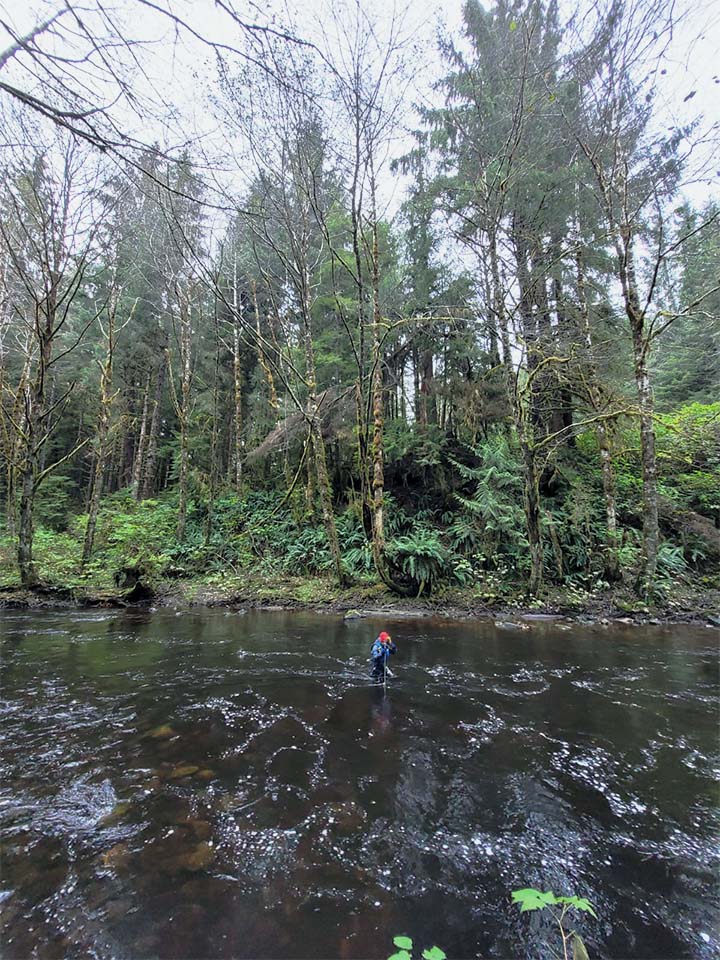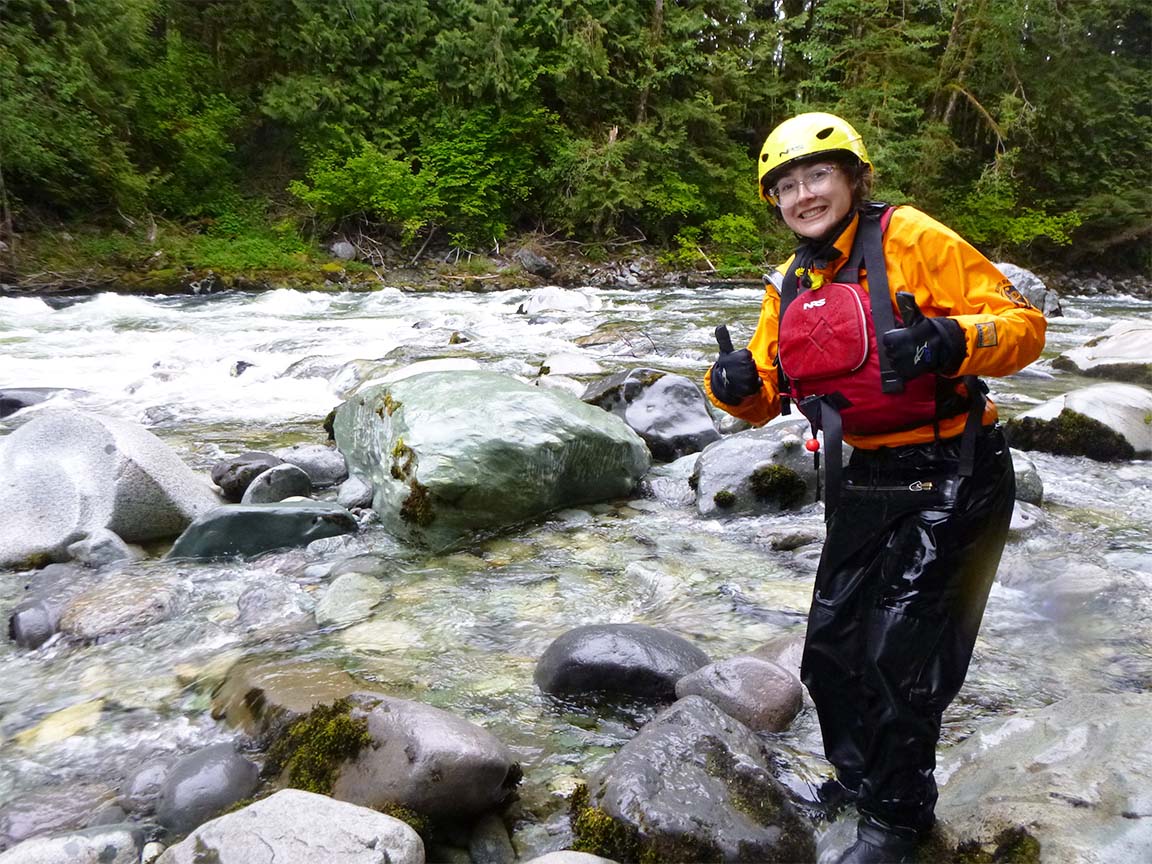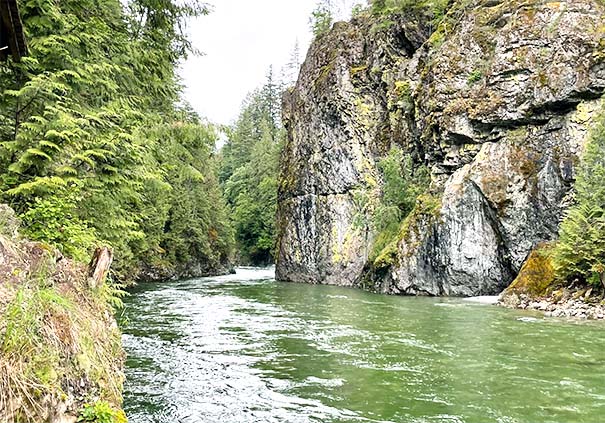Featured Student: Megan Elkin
September 20, 2023

September 20, 2023

My major is Geographical Sciences and I will graduate in May 2024.
I actually didn’t know about the Science Co-op program until a friend encouraged me to apply.
I had always known that I wanted to do something more with my degree and I started exploring programs abroad, as well as external internship opportunities. Little did I know that the Science Co-op program would become that experience!
I am thankful for the push that I needed to apply to the program, as it became a very valuable experience. I explored which types of jobs are relevant to my degree and connected with co-workers.
Most importantly, I learnt more about myself and what I want to do/can do after graduation.
I completed all 16 months with Environment and Climate Change Canada; however, I worked within three departments.
I started with an 8-month placement with the Water Survey of Canada, where I conducted fieldwork measuring water discharge and water levels in rivers around BC.
I then spent 4 months working within the Priority Sectors Unit of the Canadian Wildlife Service (CWS,) assisting with the Nature Smart Climate Solutions Fund.
I then jumped over to the Habitat Assessment and Data Management Unit within CWS Pacific Region for the final 4 months of my co-op; I worked in GIS and data management, mapping various spatial phenomena in BC.

Many of my courses at UBC assisted with my placements at ECCC.
Specifically, there are many courses within the UBC Geography Department which provided me with a strong foundation for the concepts I came across at work. For example, GEOS 370 (Advanced Geographic Information Science) taught me a variety of GIS tools and analysis techniques which I used in my placement with the Geomatics team at CWS-HADM.
My hydrology and geomorphology courses gave me a strong understanding of moving water and rivers; this helped with my work with the Water Survey as a Hydrometric Assistant.
More than just providing me with important information, these courses were part of the reason why I sought to find placements in those particular fields. I wanted to try jobs that aligned with my interests and the concepts that I learned throughout my Geographical Sciences degree.
However, most of the time I ended up learning new skills on the job; part of being a co-op student is the fact that you are there to learn and grow as an individual.
My summer adventuring around BC with the Water Survey was the best (and most unique) experience during my co-op term.
I was fortunate to visit Haida Gwaii and explore its beautiful landscape. I remember standing in the river watching the salmon swim around my legs and bald eagles fly overhead; it was surreal. We ate our lunch while the ravens danced in the sky above – I never anticipated how much I would learn and the appreciation I would gain for the land. I remember my first helicopter ride and how I was stunned by the beauty of the province we call home.
I was also very fortunate to have a great group of co-workers, who made the job even more meaningful through these experiences.

I don’t think I have one “best achievement”. I am proud of my contribution on all the projects that I was part of.
One of my highlights (maybe more of a fun experience) was landing a drone on the back of our survey boat. First, I never thought I would fly drones and take aerial photography during this placement (which was an amazing experience on its own,) but I’m proud of the skills I gained to fly these devices (and land them on moving boats.)
I was pushed in many ways during my placement at the Water Survey.
The job started with training sessions in wilderness first aid, helicopter egress and swift water rescue. Before I knew it, I learned how to safely cross rivers, drive boats and escape a helicopter cabin submerged in water.
These programs provided foundational skills and a sense of confidence going into the term. The eight months of field work challenged my physical and mental abilities in many ways, from wading in cold rivers to hiking in remote locations. Many times, I needed to trust myself, my abilities and remind myself of my strength and resilience to allow me to overcome doubts and fears.

The main station maintenance tasks included taking water levels and discharge measurements, as well as helping with other occasional tasks.
To take these measurements, I waded across rivers and used a Flow Tracker to take velocity measurements at different depths/locations. Some of our measurements were taken with a RC boat or from a sensor attached to a Cable Way; some of my duties included helping set up our measurement sections and recording data collected from the instruments.
Additionally, I assisted with installing a submersible sensor in a river which automatically records water depth and discharge periodically. I also helped install a new solar panel at one of our stations; most of the hydrometric stations run on solar power. Other tasks included site clean-up and maintenance.
The Nature Smart Climate Solutions Fund is a $1.4 billion, ten-year fund used in efforts to reduce 5-7 megatons of GHG emissions annually; to achieve this goal, the fund aims to support projects which conserve, restore and enhance wetlands, peatlands and grasslands to store and capture carbon.
The majority of my tasks in support of this fund were in outreach and communications; I was fortunate to speak with many research groups who applied for the NSCS fund and discuss their projects.
If anyone is curious, they can read more about the NSCSF here.
I’m thankful for the experiences of writing cover letters and interviewing.
In addition, each placement that I landed brought its own challenges, in which I developed new skills and strategies for solving problems. Additionally, I gained confidence in myself and what I can accomplish in a professional work setting.
My placement at the Water Survey jump-started this new confidence and pushed me out of my comfort zone (in a good way). I learned not to be afraid to ask questions or be curious. I hope to take the feedback that I received from my supervisors and apply it in future positions.
The program allowed me to explore jobs relevant to my degree.
I’m thankful for every experience and gained a better understanding of what field I see myself pursuing in the future. Co-op allowed me to network, make connections and develop valuable career relationships.
Specifically, working for the government opened many career paths, as there are opportunities to bridge back into government positions post-graduation. I feel well prepared to enter the professional workforce and take on any challenges presented.
Ask questions!
A big part of being a student employee is that you are there to learn. I found in all my positions, my supervisors and co-workers appreciated when I asked questions. If there are specific skills or topics you would like the learn, don’t be afraid to ask; in all my placements I personalized my work plan and took on tasks that interested me most.
Additionally, I recommend trying a variety of jobs. I was fortunate to have a multi-disciplinary co-op experience: working in the field, research in policy and GIS.
After graduation, I hope to pursue a MSc in Geographical Science and start the journey towards becoming a professional geo-scientist.
I’m excited to explore the many career options that follow.
We honour xwməθkwəy̓ əm (Musqueam) on whose ancestral, unceded territory UBC Vancouver is situated. UBC Science is committed to building meaningful relationships with Indigenous peoples so we can advance Reconciliation and ensure traditional ways of knowing enrich our teaching and research.
Learn more: Musqueam First Nation